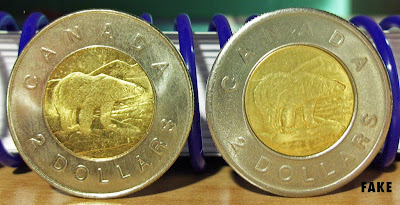A reader asked me how to check for counterfeit or fake toonies? She have some toonies with the center pop out from the coins. Is that fake or original and how to check? For information, many toonies in the first shipment of the coins were defective. It could separate if struck hard or frozen, as the centre piece would shrink more than the outside. This problem was quickly corrected by the Royal Canadian Mint. Toonie popping is a normal thing in a few month of its introduction. Some people are selling this as a mint defect and gaining profit from it. This Month, Canada Finance Minister, Jim Flaherty had announced that Loonie and Toonie would be change to steel in 2011. He didn't mention if the $2 coin will continue to be ringed and bimetal. The changes are definite, only the design have not been announced yet.
However, the only story of large fake toonies being caught is in October 2006. Royal Canadian Mount Police (RMCP) and Quebec Police found a highly sophisticated counterfeit ring that was manufacturing fake loonies and toonies. RCMP Corporal Luc Bessette said the fake money can easily be mistaken for the real thing. According to experts, it would be really hard for a normal person to make the difference between the two. The counterfeit coins weighed the same as real currency.
RCMP stumbled on the operation by accident. On Sept. 14, police in Repentigny, a city northeast of Montreal, accompanied Revenue Quebec officials to a metal token manufacturing factory in an industrial park to carry out a search warrant for GST evasion. When officials entered the factory, located at 119 l'Écuyer, Suite 400, they discovered coin-making equipment, buckets of coins almost ready for circulation, and raw materials.
Toonies exist since the withdrawal of $2 bills in 1996. You need to realize the fact that it has been over 10 years, someone already knew how to make a fake toonies. Normally, people don't check for fake coins because their value is so small. You can check the sound of fake and original coins by dropping them one at a time on a hard surface like wood but it will be time consuming. Especially if you have hundreds of them. Other way is by looking at the centre piece, the metal is not well bonded to the coin. You might pop up the centre with a little bit force using your thumb. I wish that can be any help. Will try to update if I found any story relating to this.
RCMP stumbled on the operation by accident. On Sept. 14, police in Repentigny, a city northeast of Montreal, accompanied Revenue Quebec officials to a metal token manufacturing factory in an industrial park to carry out a search warrant for GST evasion. When officials entered the factory, located at 119 l'Écuyer, Suite 400, they discovered coin-making equipment, buckets of coins almost ready for circulation, and raw materials.
Toonies exist since the withdrawal of $2 bills in 1996. You need to realize the fact that it has been over 10 years, someone already knew how to make a fake toonies. Normally, people don't check for fake coins because their value is so small. You can check the sound of fake and original coins by dropping them one at a time on a hard surface like wood but it will be time consuming. Especially if you have hundreds of them. Other way is by looking at the centre piece, the metal is not well bonded to the coin. You might pop up the centre with a little bit force using your thumb. I wish that can be any help. Will try to update if I found any story relating to this.
Source: CBC News, Coin Community.com, Wikipedia.

